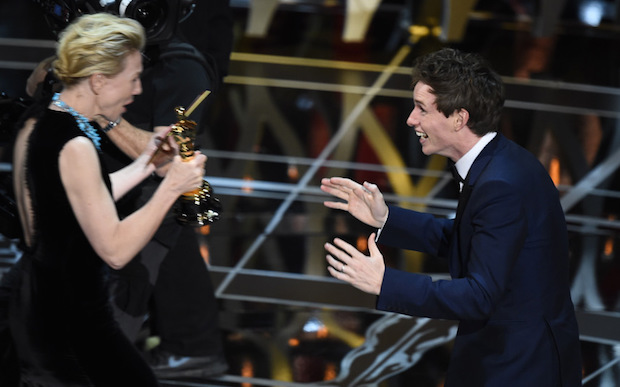Birdman soared past longtime favourite Boyhood at the 87th Academy Awards, as Alejandro González Iñárritu’s hilarious Hollywood satire unexpectedly took both of the top prizes – best picture and director – and joint top number of awards overall, in a slightly awkward ceremony where many of the host’s razor-edged jokes drew clear disapproval from the audience.
While many were predicting a slightly irreverent evening, Neil Patrick Harris, a veteran host of the Tony Awards, arguably took his jokes at the podium too far. Following a punchy opener chastising the Academy for the lack of ethnic diversity among this year’s nominees (the 20 acting nominations all went to white actors for just the second time in nearly two decades), he went on to direct jokes at black actors in the audience, including Oprah Winfrey, Octavia Spencer and David Oyelowo, none of whom looked amused.
Birdman’s star, Michael Keaton, lost out in the hotly contested best actor category to Eddie Redmayne, who won for his sensitive and intelligent performance as the wheelchair-bound physicist Stephen Hawking in the British film The Theory of Everything, while Julianne Moore finally joined the Academy’s honour roll, taking best actress for Still Alice, in which she plays an academic with early onset Alzheimer’s. Though victory for playing disabled characters is something of an Oscars cliché, in this case both were well deserved.
Richard Linklater’s much-loved coming-of-age tale Boyhood, filmed over 12 years, went home nearly empty-handed, save for the best supporting actress award won by Patricia Arquette, who used her speech to call for equal pay for women. The film’s losses will be a hot topic for years to come. The other British hopeful The Imitation Game, nominated for eight Oscars, won just one, adapted screenplay.
Best supporting actor was won by J.K. Simmons for his unforgettable performance as the terrifying jazz tutor in the deliciously frenzied Whiplash, which also took statuettes for editing and sound mixing.
Four awards went to Wes Anderson’s typically quirky but unusually palatable comedy The Grand Budapest Hotel, the same number as Birdman, while Interstellar and the controversial box office hit American Sniper won a technical prize each. Ida, a hauntingly beautiful black and white film set in post-Second World War Poland, won best foreign film over the rebellious Russian tragi-comedy Leviathan.
The eighth time proved a charm for oft-nominated French composer Alexandre Desplat, who won original score for Grand Budapest.







Comments